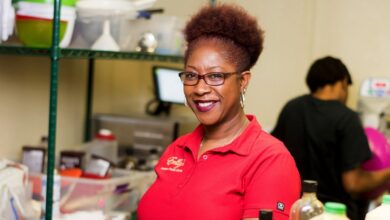Building up Birmingham’s Black businesses

We’re also collaborating with local leaders and Black small business owners to try new approaches and integrate digital tools to help them overcome systemic barriers and grow. Avrie and Phillip Powell, the entrepreneurs behind Aww Shucks gourmet corn, told us about the challenges they faced accessing capital and weathering inflation when they started a food truck company during the pandemic. Through In Solidarity and other local programs, we connected the Powells to resources and digital training, and they’ve grown their business to include a second food truck and a brick-and-mortar restaurant.
Two years into our work in Birmingham, we’re reflecting on the lessons we’ve learned and hope that by sharing them with others they will inspire sustained and deeper commitments to advancing racial equity.
First, use your superpower. For Mastercard, our superpower is our network — that includes tens of thousands of banks and fintechs and millions of merchants and cardholders in the U.S. For example, by bringing together our partners, we worked with the city to launch Ascend Birmingham, a program designed to help small businesses pivot to digital operations and thrive in an age of more digitally engaged consumers.
Second, inclusion takes intention. For example, major events like the 2022 World Games drew tourists from all over the world to Birmingham. Knowing that small businesses can lose out on tourism revenue, we partnered with city leaders and the Birmingham Business Resource Center to create a satellite marketplace showcasing 30 Black-owned businesses in the city’s historic Civil Rights District. Through our partnership with the BBRC, we also funded the A.G. Gaston Business Directory, an online community resource of nearly 1,000 Black-owned businesses. Both the Civil Rights District marketplace and this grant have raised the visibility of Black-owned businesses, helping them attract new customers and grow their revenue.
Third, proximity matters. In Birmingham, we’ve also seen that social capital is as important as financial capital, and knowledge gained by experience is priceless. That’s why we’re partnering with local organizations like the Birmingham Business Resource Center and Urban Impact to connect small business owners with experts and resources that understand their specific challenges. And with digital platform Hello Alice, we’re building an online community for Black small business owners in Birmingham to exchange ideas, learn about funding opportunities and access other resources to help generate and sustain their growth.
Building an inclusive economy — in Birmingham and beyond – could not be more urgent or important. As the business community continues to focus on how it can help to close the wide racial wealth and opportunity gaps, and as Birmingham commemorates 60 years since the civil rights movement, we hope the work we’re doing — and, most importantly, the people we’re working with — will inspire continued action and impact.
By leveraging our network, engaging local communities and providing entrepreneurs with the technological skills to keep growing, we can help Black-owned businesses power a more inclusive and prosperous economy for all.
Banner photo: Food truck entrepreneurs Avrie and Phillip Powell cut the ribbon at the opening of their brick-and-mortar gourmet corn store Aww Shucks in Birmingham.























































